This article is taken from an extensive feature on the 2023 HAEi Regional Conference APAC, published in Global Perspectives #1 2023
The Scientific Committee members joining us in Bangkok each gave a presentation covering a topic raised by our community in APAC.
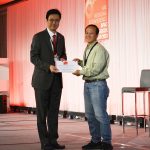 Before the talks began, Dr. Hiroshi Chantaphakul, Co-Chair of the Scientific Committee, presented the Scientific Track Young Researcher Award. The award is granted to an abstract authored by – either solely or as part of a team – a young investigator or researcher deemed to be of the highest quality by the conference Scientific Committee. Unfortunately, the recipient, Dr. Zeijan Zhang of China, could not attend the meeting. Dr. Zhang was announced as the award winner during the Scientific Track, and Mr. Xiaogang Qi of HAE China received the award on her behalf during the main program.
Before the talks began, Dr. Hiroshi Chantaphakul, Co-Chair of the Scientific Committee, presented the Scientific Track Young Researcher Award. The award is granted to an abstract authored by – either solely or as part of a team – a young investigator or researcher deemed to be of the highest quality by the conference Scientific Committee. Unfortunately, the recipient, Dr. Zeijan Zhang of China, could not attend the meeting. Dr. Zhang was announced as the award winner during the Scientific Track, and Mr. Xiaogang Qi of HAE China received the award on her behalf during the main program.
Dr. Chantaphakul then discussed laryngeal edema in HAE, its symptoms, the importance of their recognition, for example, >50% of patients report prodromal symptoms like a rash or muscle aches before this type of attack, and how it can be treated. His take-home message for all people with HAE was that these attacks should be treated regardless of location or severity.
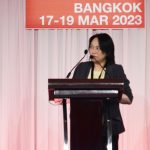 In the next talk, Dr. Narissara Suratannon discussed access to medications, particularly androgens, and FFP, two more commonly available in the Asia Pacific region. She gave an overview of both types of medicine, how they can most effectively be used to manage and treat HAE, and some of the concerns and practicalities of using these medicines. Finally, she closed her talk with a call for more access to pathway-targeted therapies with high efficacy and good safety profiles in the Asia Pacific region.
In the next talk, Dr. Narissara Suratannon discussed access to medications, particularly androgens, and FFP, two more commonly available in the Asia Pacific region. She gave an overview of both types of medicine, how they can most effectively be used to manage and treat HAE, and some of the concerns and practicalities of using these medicines. Finally, she closed her talk with a call for more access to pathway-targeted therapies with high efficacy and good safety profiles in the Asia Pacific region.
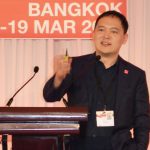 Dr. Philip Li stressed that ‘you need your doctors, but your doctors also need you’ as part of his talk on the importance of doctors and patients working together. He outlined what doctors can do for patients regarding diagnosis, advice, treatment, and family planning in the context of the information provided by patients and the services and support that society offers. Dr. Li stressed the need for individuals, families, patient groups, and society to work together to improve awareness, access, advocate, and form alliances in the Asia Pacific region. In his words: “The engine of change is with you.”
Dr. Philip Li stressed that ‘you need your doctors, but your doctors also need you’ as part of his talk on the importance of doctors and patients working together. He outlined what doctors can do for patients regarding diagnosis, advice, treatment, and family planning in the context of the information provided by patients and the services and support that society offers. Dr. Li stressed the need for individuals, families, patient groups, and society to work together to improve awareness, access, advocate, and form alliances in the Asia Pacific region. In his words: “The engine of change is with you.”
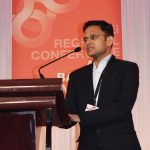 The next topic covered was HAE in children and the importance of family screening. In this talk, Dr. Ankur Jindal gave an overview of how HAE in children differs from adults covering diagnosis and management, emphasizing that ‘Children with HAE are not small adults.’ He then discussed the how and why of family screening and stressed the importance of family members of patients with HAE being screened; grandparents, parents, siblings, children, and grandchildren to improve the lives of those potentially living with undiagnosed HAE.
The next topic covered was HAE in children and the importance of family screening. In this talk, Dr. Ankur Jindal gave an overview of how HAE in children differs from adults covering diagnosis and management, emphasizing that ‘Children with HAE are not small adults.’ He then discussed the how and why of family screening and stressed the importance of family members of patients with HAE being screened; grandparents, parents, siblings, children, and grandchildren to improve the lives of those potentially living with undiagnosed HAE.
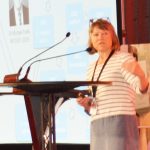 Dr. Hilary Longhurst closed this session by posing the question, ‘What’s good about taking part in research?’ She then covered a compelling list of benefits that included: The potential to access to study medicine until regulatory authorities approve it, Being seen by an HAE expert, and Helping to move science forward by getting new and better medicines approved. Many people in clinical trials cite feeling good about giving something back and contributing to an important cause.
Dr. Hilary Longhurst closed this session by posing the question, ‘What’s good about taking part in research?’ She then covered a compelling list of benefits that included: The potential to access to study medicine until regulatory authorities approve it, Being seen by an HAE expert, and Helping to move science forward by getting new and better medicines approved. Many people in clinical trials cite feeling good about giving something back and contributing to an important cause.
Find more feature articles from the 2023 HAEi Regional Conference APAC:










